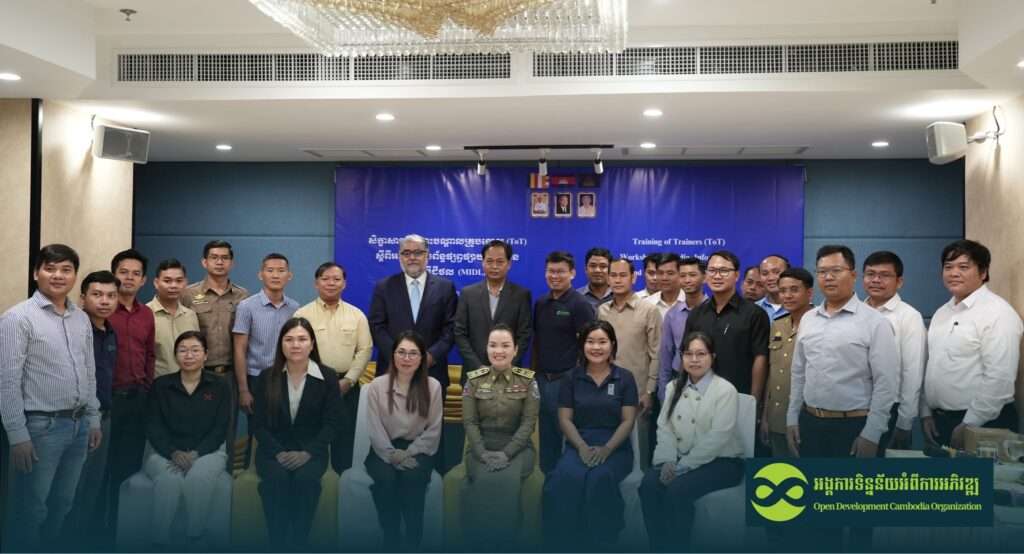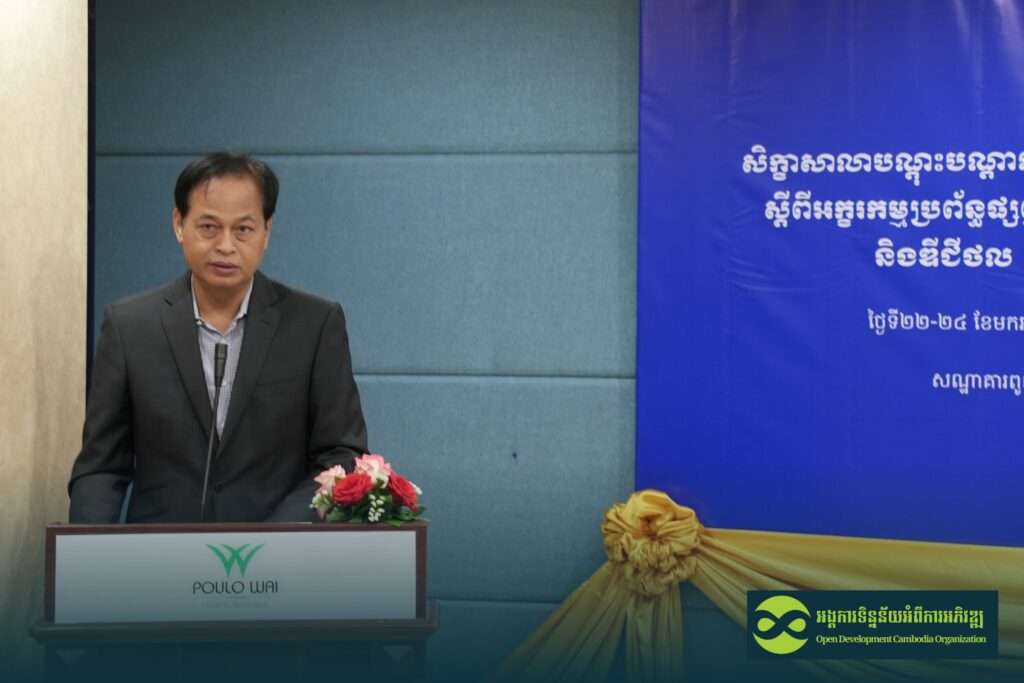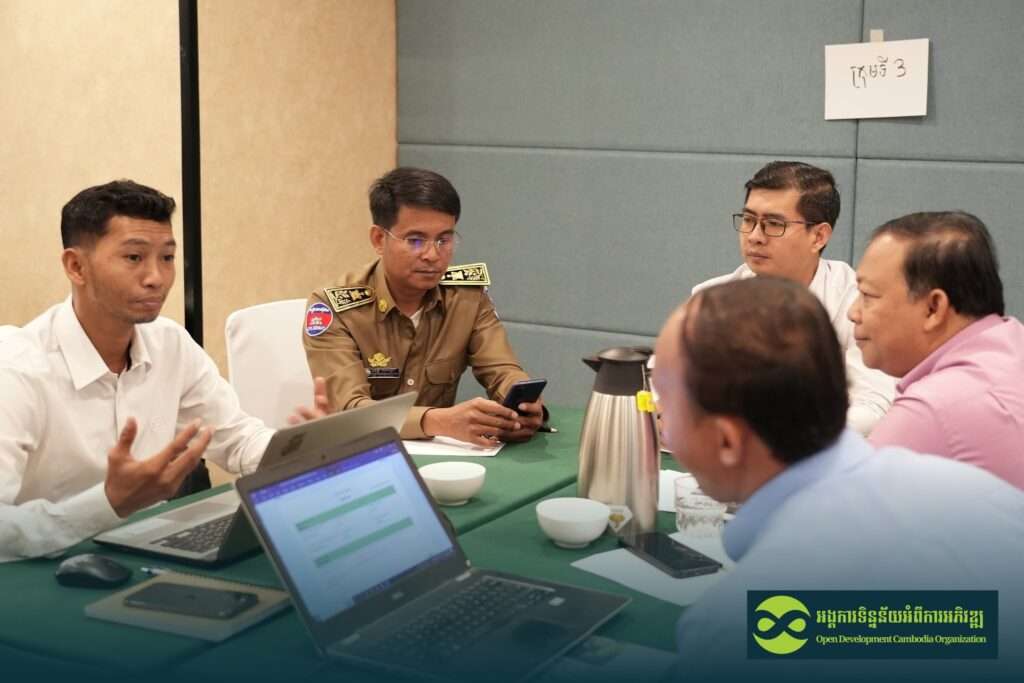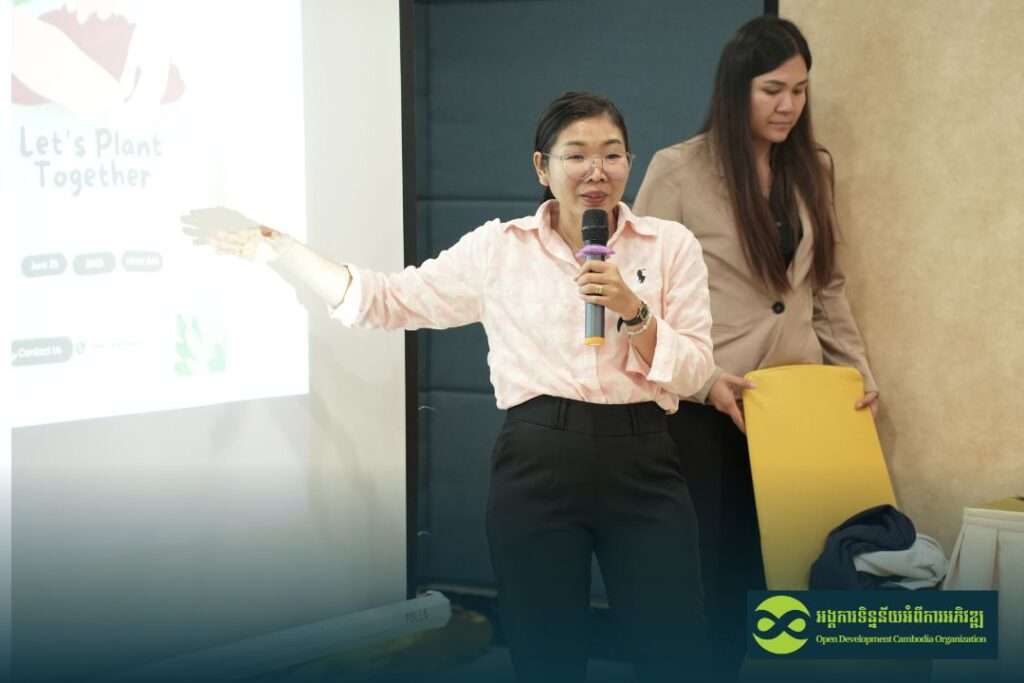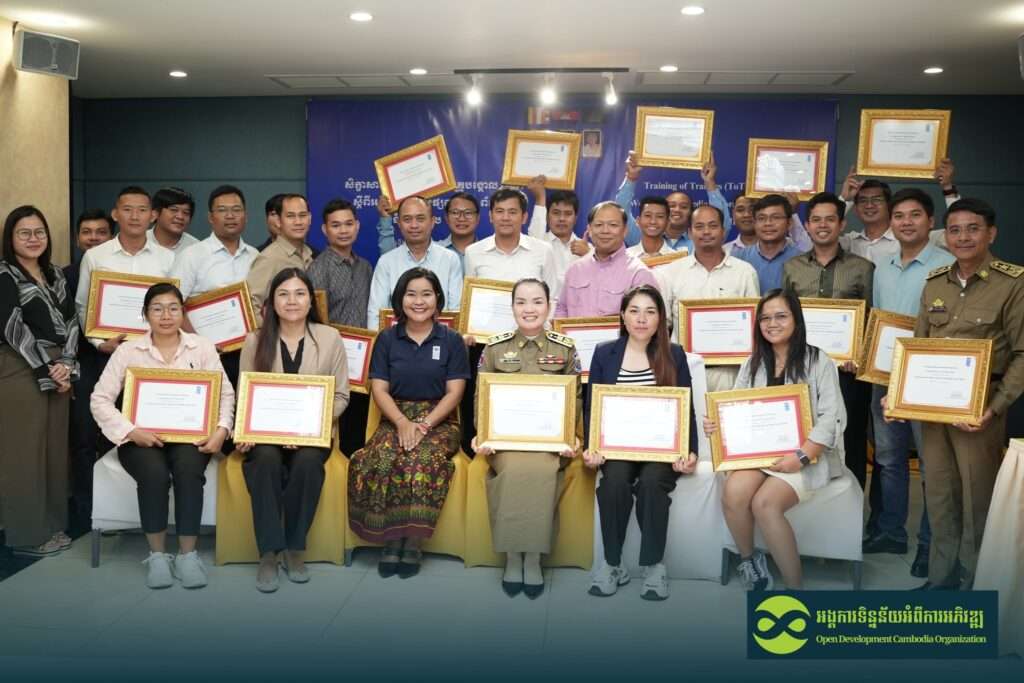សិក្ខាសាលាបណ្តុះបណ្តាលគ្រូបណ្តុះបណ្តាល (ToT) ស្តីពី អក្ខរកម្មប្រព័ន្ធផ្សព្វផ្សាយ ព័ត៌មាន និង ឌីជីថល (MIDL) ដើម្បីពង្រឹងតម្លាភាព និងគណនេយ្យភាពក្នុងអភិបាលកិច្ចមូលដ្ឋាន តាមរយៈការចូលរួមរបស់ប្រជាពលរដ្ឋ
កម្មវិធីអភិវឌ្ឍន៍សហប្រជាជាតិកម្ពុជាសហការជាមួយ អង្គការទិន្នន័យអំពីការអភិវឌ្ឍ (អូឌីស៊ី) រៀបចំសិក្ខាសាលាបណ្តុះបណ្តាលស្តីពី អក្ខរកម្មប្រព័ន្ធផ្សព្វផ្សាយ ព័ត៌មាន និងឌីជីថល (MIDL) ទៅដល់គ្រូបង្គោល (ToT) ចំនួន ២៤នាក់ (ស្រី ៥នាក់) ដែលជាតំណាងមកពីលេខាធិការដ្ឋានគណៈកម្មាធិការជាតិសម្រាប់ការអភិវឌ្ឍតាមបែបប្រជាធិបតេយ្យនៅថ្នាក់ក្រោមជាតិ (លេខាធិការដ្ឋាន គ.ជ.អ.ប) រដ្ឋបាលក្រុង សាលាជាតិរដ្ឋបាលមូលដ្ឋាន (NASLA) រដ្ឋបាលក្រុង និងអង្គការសង្គមស៊ីវិល (CSOs) នៅក្រុងកំពង់ចាម (ខេត្តកំពង់ចាម) ក្រុងបានលុង (ខេត្តរតនគិរី) និងក្រុងសៀមរាប (ខេត្តសៀមរាប) នៅភ្នំពេញ កាលពីថ្ងៃទី២២ ដល់ ថ្ងៃទី២៤ ខែមករា ឆ្នាំ២០២៥។
គោលបំណងចម្បងនៃវគ្គបណ្តុះបណ្តាល ToT នេះគឺដើម្បីបណ្តុះបណ្តាលអ្នកតំណាងទាំងនោះឱ្យក្លាយជាគ្រូបណ្តុះបណ្តាលដែលអាចផ្តល់ការបណ្តុះបណ្តាល MIDL បន្តដល់ប្រជាជនកាន់តែទូលំទូលាយនៅក្នុងក្រុងគោលដៅទាំងបី។ វគ្គបណ្តុះបណ្តាលនេះមានគោលបំណងដូចខាងក្រោម៖
- ផ្តល់ជូនអ្នកចូលរួមនូវចំណេះដឹង និងជំនាញដើម្បីវាយតម្លៃខ្លឹមសារប្រព័ន្ធផ្សព្វផ្សាយ ការចូលប្រើព័ត៌មានពាក់ព័ន្ធ និងការស្វែងរកវេទិកាឌីជីថលប្រកបដោយការទទួលខុសត្រូវ។
- រៀបចំការត្រៀមខ្លួនដល់អ្នកចូលរួមដើម្បីផ្តល់ការបណ្តុះបណ្តាល MIDL បន្ដដល់ប្រជាពលរដ្ឋនៅក្នុងសហគមន៍របស់ពួកគេ ដោយប្រើវិធីសាស្ត្របង្រៀនប្រកបដោយប្រសិទ្ធភាព ដើម្បីពង្រីកចំណេះដឹងលើប្រព័ន្ធផ្សព្វផ្សាយ និងអក្ខរកម្មឌីជីថល។
ក្នុងសុន្ទរកថាស្វាគមន៍ លោក Amir Goraya ប្រធានផ្នែកអភិបាលកិច្ច នៃកម្មវិធីអភិវឌ្ឍន៍សហប្រជាជាតិកម្ពុជា (យូអិឌីភី) បានលើកឡើងពីសារៈសំខាន់នៃការពង្រឹងតម្លាភាព និងគណនេយ្យភាពក្នុងអភិបាលកិច្ចមូលដ្ឋាន តាមរយៈការចូលរួមរបស់ប្រជាពលរដ្ឋ។ លោកបានសង្កត់ធ្ងន់លើសារៈសំខាន់នៃការពង្រឹងតម្លាភាព និងគណនេយ្យភាពក្នុងអភិបាលកិច្ចមូលដ្ឋាន តាមរយៈគម្រោងការចូលរួមរបស់ប្រជាពលរដ្ឋ (STA) គឺដើម្បីរួមចំណែកដល់កម្មវិធីជាតិស្តីពី ការអភិវឌ្ឍតាមបែបប្រជាធិបតេយ្យនៅថ្នាក់ក្រោមជាតិដំណាក់កាលទី២ ដោយផ្តោតលើ ការកែលម្អអភិបាលកិច្ចមូលដ្ឋាន តាមរយ:ការបង្កើនលទ្ធភាពទទួលបានព័ត៌មាន និងជំរុញឱ្យមានការចូលរួមកាន់តែច្រើនក្នុងការរៀបចំផែនការថវិកា និងការត្រួតពិនិត្យមូលដ្ឋាន។
លោក សុខ ជឿន អនុប្រធានអង្គភាពត្រួតពិនិត្យ វាយតម្លៃ និងព័ត៌មាន នៃលេខាធិការដ្ឋាន គ.ជ.អ.ប. បានលើកឡើងក្នុងសុន្ទរកថាបើករបស់លោកថា លោកមានជំនឿយ៉ាងមុតមាំថា សិក្ខាសាលា “អក្ខរកម្មឌីជីថល ព័ត៌មាន និងប្រព័ន្ធផ្សព្វផ្សាយ (MIDL)” នឹងផ្តល់ចំណេះដឹងដ៏មានតម្លៃបន្ថែមដល់អ្នកចូលរួម ដើម្បីបង្កើនការងាររបស់ពួកគេក្នុងការអប់រំ និងបម្រើសហគមន៍ក្នុងក្រុងគោលដៅទាំងបី។ លោកក៏បានលើកឡើងពីតួនាទីនៃកិច្ចសហការផ្នែកបច្ចេកវិទ្យា និងអង្គការសង្គមស៊ីវិលក្នុងការកែលម្អការផ្សព្វផ្សាយព័ត៌មាន និងការផ្តល់សេវាសាធារណៈ ស្របតាមគោលដៅនៃកម្មវិធីជាតិសម្រាប់ការអភិវឌ្ឍតាមបែបប្រជាធិបតេយ្យនៅថ្នាក់ក្រោមជាតិដំណាក់កាលទី២។ លោកបានលើកទឹកចិត្តឱ្យចូលរួមក្នុងការពិភាក្សាឱ្យបានផុសផុល និងលើកជាយោបល់នានាឱ្យបានច្រើនដើម្បីធ្វើការផ្លាស់ប្តូរបទពិសោធន៍ឱ្យបានស៊ីជម្រៅ។
ថ្ងៃទី១៖ ការណែនាំអំពីទិដ្ឋភាពទូទៅ និងបុព្វហេតុនៃវគ្គសិក្សា
ថ្ងៃដំបូងគឺចាប់ផ្តើមជាមួយនឹងការចុះឈ្មោះ និងសុន្ទរកថាស្វាគមន៍របស់លោក Amir Khan Goraya ប្រធានផ្នែកអភិបាលកិច្ច នៃកម្មវិធីអភិវឌ្ឍន៍សហប្រជាជាតិកម្ពុជា (យូអិឌីភី) សុន្ទរកថាបើករបស់លោក សុខ ជឿន អនុប្រធានអង្គភាពត្រួតពិនិត្យ វាយតម្លៃ និងព័ត៌មាន នៃលេខាធិការដ្ឋាន គ.ជ.អ.ប. អមដោយការណែនាំខ្លួនឯងរបស់សិក្ខាកាមទាំងអស់ និងតេស្តសាកល្បងមុនវគ្គបណ្តុះបណ្តាលដើម្បីវាយតម្លៃចំណេះដឹងមូលដ្ឋានរបស់សិក្ខាកាមទាំងអស់។ កញ្ញា ឈួន ណារ៉េត អ្នកសម្របសម្រួលបច្ចេកទេសគម្រោង STA យូអិឌីភីកម្ពុជា បានផ្តល់បទបង្ហាញអំពីគម្រោង STA ដោយផ្តោតលើទិដ្ឋភាពទូទៅ និងគោលបំណងនៃគម្រោង។ វគ្គព្រឹកនេះ ដឹកនាំដោយអ្នកជំនាញអក្ខរកម្ម MIDL របស់អូឌីស៊ីបានគ្របដណ្តប់លើ៖
- ការណែនាំអំពីទិដ្ឋភាពទូទៅ និងបុព្វហេតុនៃវគ្គសិក្សា៖ គ្រូបណ្តុះបណ្តាលបានគូសបញ្ជាក់អំពីរចនាសម្ព័ន្ធវគ្គសិក្សា និងការរំពឹងទុក ដោយផ្តោតលើទំនាក់ទំនងរវាង MIDL អភិបាលកិច្ចល្អ និងការចូលរួមរបស់ប្រជាពលរដ្ឋ។ អ្នកចូលរួមបានសិក្សា ពីតួនាទីជាគ្រូបង្គោលក្នុងការអប់រំពលរដ្ឋ។
- វិធីសាស្ត្របង្រៀន MIDL: ទ្រឹស្ដី និងការអនុវត្ត៖ គោលគំនិតគរុកោសល្យ រួមទាំងការអប់រំផ្អែកលើសមត្ថភាព និងគរុកោសល្យផ្អែកលើតម្លៃ (VbE) ត្រូវបានបង្ហាញ និងណែនាំ។ ករណីសិក្សា និងវិធីសាស្ដ្រ Bloom’s Taxonomy ត្រូវបានពិភាក្សារួមជាមួយនឹងប្រភេទនៃការវាយតម្លៃ (ការវិនិច្ឆ័យ ការធ្វើទម្រង់ ការសង្ខេប និងការវាយតម្លៃដោយមិនដឹងខ្លួន) ។
- គោលការណ៍សិក្សាសម្រាប់មនុស្សពេញវ័យ៖ វគ្គនេះគ្របដណ្តប់លើគោលការណ៍សិក្សារបស់មនុស្សពេញវ័យប្រកបដោយប្រសិទ្ធភាព វិធីសាស្ត្ររៀនអន្តរកម្ម និងបច្ចេកទេសបង្រៀនដូចជា ការរៀនផ្អែកលើបញ្ហា និងករណីសិក្សា។ អ្នកចូលរួមក៏បានរៀនពីរបៀបបង្កើតផែនការមេរៀន និងចូលរួមជាមួយអ្នកសិក្សាដោយប្រើវិធីសាស្ត្រចូលរួម។
ជាចុងបញ្ចប់នៃវគ្គបណ្ដុះបណ្ដាលថ្ងៃទី១ សិក្ខាកាមត្រូវបានបែងចែកជា ៥ក្រុម ដើម្បីរៀបចំបទបង្ហាញលើប្រធានបទផ្សេងៗគ្នា រួមជាមួយនិងសំណួរស្តីពីវិធីសាស្ត្រគរុកោសល្យ។ វគ្គបណ្ដុះបណ្ដាលថ្ងៃនេះត្រូវបានបញ្ចប់ជាមួយនឹងការរំលឹកឡើងវិញនៃវិធីសាស្ត្របណ្តុះបណ្តាល និងជំនាញសំខាន់ៗសម្រាប់អ្នកបណ្តុះបណ្តាលប្រកបដោយប្រសិទ្ធភាព។
ថ្ងៃទី២៖ ទ្រឹស្តី និងការអនុវត្ត
ថ្ងៃទីពីរបានផ្តោតលើទ្រឹស្តី និងការអនុវត្តរបស់ MIDL រួមទាំងការវិវត្តន៍នៃគោលគំនិត MIDL និងការណែនាំអំពីក្របខ័ណ្ឌសមត្ថភាព MIDL ។ គ្រូបណ្តុះបណ្តាលបានរៀបចំកម្រងសំណួរ ដើម្បីវាយតម្លៃការយល់ដឹងរបស់អ្នកចូលរួម។ វគ្គបន្ទាប់បង្ហាញពីការប្រើប្រាស់វេទិការបណ្ដាញសង្គម កំណត់អត្តសញ្ញាណ និងផ្ទៀងផ្ទាត់ព័ត៌មាន និងសុវត្ថិភាពឌីជីថល និងឯកជនភាពទិន្នន័យ។ អ្នកចូលរួមបានរៀនពីរបៀបវាយតម្លៃ និងប្រើប្រាស់ធនធានឌីជីថល និងប្រព័ន្ធផ្សព្វផ្សាយដោយយកចិត្តទុកដាក់លើការកំណត់ឯកជនភាព និងការយល់ដឹងអំពី ព័ត៌មានភ័ន្តច្រឡំ ព័ត៌មានក្លែងបន្លំ និងព័ត៌មានបំភ្លៃ។
វគ្គបណ្ដុះបណ្ដាលនេះក៏រួមបញ្ចូលការណែនាំអំពីការពិនិត្យការពិតលើមាតិកាឌីជីថល និងសារៈសំខាន់នៃអនាម័យ និងសុវត្ថិភាពឌីជីថលផងដែរ។ បន្ទាប់មកអ្នកចូលរួមត្រូវធ្វើតេស្ដលើកម្រងសំណួរ ដើម្បីវាយតម្លៃការយល់ដឹង បន្ទាប់មកមានការពិភាក្សាអំពីក្រមសីលធម៌ឌីជីថល។ ជាបញ្ចប់ គ្រូបណ្តុះបណ្តាលបានសង្កត់ធ្ងន់លើការរួមបញ្ចូលគោលគំនិត MIDL ចូលទៅក្នុងការបង្រៀន ដោយលើកទឹកចិត្តឱ្យមានការវិភាគលើមាតិកាឌីជីថល និងអាកប្បកិរិយាទទួលខុសត្រូវលើអ៊ីនធឺណិត។
ថ្ងៃទី៣៖ ការអនុវត្តការបង្រៀន
ថ្ងៃទីបី គឺនិយាយអំពីការអនុវត្តការបង្រៀនដែលសិក្ខាកាមចាប់ផ្តើមធ្វើការជា ៥ក្រុម ដោយមាន ៥ប្រធានបទផ្សេងៗគ្នារួមមាន៖
- មេរៀនទី១៖ ព័ត៌មានភាន់ច្រឡំ ព័ត៌មានក្លែងបន្លំ និងព័ត៌មានបំភ្លៃ
- មេរៀនទី២៖ ក្រមសីលធម៌ក្នុងការប្រើប្រាស់ប្រព័ន្ធផ្សព្វផ្សាយសង្គម
- មេរៀនទី៣៖ ការប្រើប្រាស់ថ្នាលឌីជីថល
- មេរៀនទី៤៖ សន្ដិសុខឌីជីថលនិងអនាម័យឌីជីថល
- មេរៀនទី៥៖ ការការពារទិន្នន័យនិងឯកជនភាព
សិក្ខាកាមពិភាក្សាជាក្រុម ដោយធ្វើការស្រាវជ្រាវ និងរៀបចំផែនការលើតួនាទីបណ្តុះបណ្តាល។ នៅពេលរសៀល សិក្ខាកាមមកពីក្រុមទាំងប្រាំបានចាប់ផ្តើមតួនាទីបណ្តុះបណ្តាល លើប្រធានបទដែលបានកំណត់។ បន្ទាប់ពីបានធ្វើបទបង្ហាញតួនាទីបណ្ដុះបណ្ដាល គ្រូបង្គោលបានផ្ដល់មតិកែលម្អដល់សិក្ខាកាមលើផែនការមេរៀន ខ្លឹមសារ និងការអនុវត្តការបណ្ដុះបណ្ដាល។
សិក្ខាកាមបានធ្វើតេស្តមុន និងក្រោយវគ្គបណ្តុះបណ្តាល ដើម្បីវាយតម្លៃការយល់ដឹងខ្លឹមសារនៃវគ្គបណ្ដុះបណ្ដាល។ ការធ្វើតេស្ដនេះ បានផ្ដល់ឱ្យគ្រូបណ្តុះបណ្តាល និងអ្នករៀបចំស្វែងរកផ្នែកល្អ និងផ្នែកខ្វះខាត សម្រាប់ការពង្រឹងជំនាញ។ បន្ទាប់ពីមេរៀននីមួយៗ អ្នកចូលរួមត្រូវបានផ្តល់បទពិសោធន៍ជាក់ស្តែង តាមរយៈកម្រងសំណួរដែលរៀបចំដោយគ្រូបណ្តុះបណ្តាល។ កម្រងសំណួរពាក់ព័ន្ធរួមមានការចូលរួមដោយកិច្ចការបុគ្គល និងការពិភាក្សាជាក្រុម ដោយមានការជួយសម្របសម្រួលផ្នែកបច្ចេកទេស ដើម្បីធានាបានថាសិក្ខាកាមទទួលបាននូវអ្វីដែលគ្រូឧទ្ទេសបានចែករំលែកនិងណែនាំនៅក្នុងមេរៀននីមួយៗ។
មុននឹងបញ្ចប់វគ្គបណ្ដុះបណ្ដាល គ្រូឧទ្ទេសបានស្នើឱ្យអ្នកចូលរួមបំពេញទម្រង់វាយតម្លៃ។ អ្នកចូលរួមបានបង្ហាញនូវចំណាប់អារម្មណ៍ពេញចិត្តចំពោះវគ្គបណ្ដុះបណ្ដាលនេះ ដោយបានកោតសរសើរចំពោះចំណេះដឹង និងជំនាញដែលពួកគេទទួលបានសម្រាប់ការអភិវឌ្ឍន៍ផ្ទាល់ខ្លួន និងវិជ្ជាជីវៈ ជាពិសេសទាក់ទងនឹងការងារបច្ចុប្បន្នរបស់ពួកគេ។ វគ្គបណ្តុះបណ្តាលបានបញ្ចប់ដោយពិធីប្រគល់វិញ្ញាបនបត្រដល់អ្នកដែលបានចូលរួមយ៉ាងសកម្មពេញលេញក្នុងវគ្គបណ្តុះបណ្តាលរយៈពេលបីថ្ងៃកន្លងមក។
